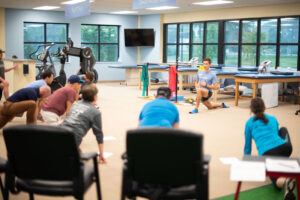5 Concussion Myths Debunked
Did you know that 4 million sports concussions occur annually? Playing sports is not the only way a concussion can be sustained. Car accidents, work accidents, and other unlucky occurrences can result in a concussion and the symptoms can often times go undiagnosed. Concussion treatment has evolved as well! Below are a few of the outdated beliefs about concussions and how to treat them so those suffering from a concussion have a better chance of recovery.
Myth 1: You have to lose consciousness to sustain a concussion. False.
You don’t even need an impact to the head to have one. It is important to recognize the symptoms instead, such as:
- headaches
- blurred/double vision
- fatigue
- loss of concentration
- sensitivity to light/noise
- nausea/vomiting
- ringing in the ears
- slurred/slow speech
- increased imbalance/clumsy
Myth 2: You need to stay in a dark, quiet place until you are better. False.
This is ok for the first 24 hours, but after that your brain needs to slowly get used to stimulus again. This is when it is best to contact a concussion specialist so that you can be evaluated and be guided on the proper protocol based on your symptoms.
Myth 3: You cannot go to sleep the night after a concussion. False.
Your brain needs rest, so as long as you’ve been checked by a medical professional, you can sleep as much as you need.
Myth 4: MRIs can show concussions. False.
They only make sure you haven’t done any other damage, like bleeding. You cannot see a concussion.
Myth 5: All concussions take months to heal. False.
75% of people have a recovery in 20-30 days. When it takes longer, it’s called post concussion syndrome, and physical therapy is recommended to treat it. It is best to consult with a concussion specialist such as the physical therapists in the Howell location of Atlantic Physical Therapy Center. No prescription is needed and appointments are readily available to get those suffering from post concussion syndrome the help they need as soon as possible.
Chris Beltran, PT, DPT is the Clinic Director of the Howell location as well as the Concussion Management Center. He is Certified in Concussion and Vestibular Therapy and is ImPACT® Credentialed.



Recent Comments